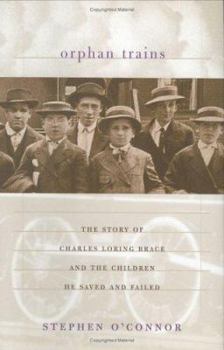Orphan Trains: The Story of Charles Loring Brace and the Children He Saved and Failed
Select Format
Select Condition 
Book Overview
In mid-nineteenth-century New York, vagrant youth, both orphans and runaways, filled the streets. For years the city had been sweeping these children into prisons or almshouses, but in 1853 the young... This description may be from another edition of this product.
Format:Hardcover
Language:English
ISBN:0395841739
ISBN13:9780395841730
Release Date:January 2001
Publisher:Houghton Mifflin
Length:384 Pages
Weight:0.60 lbs.
Dimensions:1.3" x 6.3" x 9.3"
Customer Reviews
4 ratings
Orphan trains
Published by Thriftbooks.com User , 16 years ago
Charles Loring Brace's story, his life, his work, his failures and accomplishments on caring for orphaned and abandoned children. Extremely interesting and well-written story that brings both information, insights and ways to understand the paths of welfare in USA.
The origins of the American child welfare system
Published by Thriftbooks.com User , 19 years ago
There've been plenty of books published selecting Orphan Train children as the protagonists, but relatively few stand-alone volumes consider the origins and social implications of the American child welfare system which emerged in mid-19th century New York to handle to dearth of orphans and runaways on the New York City streets. One man's vision of rescue became the famous Orphan Trains program, and Stephen O'Connor's history and biography focus on one Christian minister Charles Loring Brace, the man who created the Children's Aid Society to handle these children more humanely.
An interesting and important book.
Published by Thriftbooks.com User , 22 years ago
Some people say you can judge a society by how it treats its weakest members, and if that is true the United States has repeatedly failed the test. When it comes to dealing with the most vulnerable people among us Ñ children whose families can not or will not take care of them Ñ over and over we turn our backs on horrible examples of abuse and neglect.After reading Orphan Trains, which deals with the origins of the foster care system in the mid-nineteenth century, the first attempts to deal with the problems of children without families, rather than dealing with the problems (primarily crime) that such children created for society, IÕm struck by the fact that this failure is far from a new thing.Charles Loring Brace, the founder of the ChildrenÕs Aid Society, which found homes for orphans, runaways, and children who had essentially been abandoned by their families, was both an intelligent and a well-intentioned man. Fighting the prejudice of his time, he argued that homeless children were not criminals and threats to society, but potentially upstanding citizens. All they needed was the love and attention of a family. A noble sentiment, but unfortunately Brace mixed it with another noble, but tragically wrong, sentiment. He believed that all middle class families, especially farm families, were good. So he put New York children on trains headed west to be taken in by just about any family that would have them. Many children were adopted by wonderful, caring families, but others ended up as virtual slave labor. Girls were often subject to sexual abuse.In hindsight, it is easy for us to see the flaws in BraceÕs thinking. But in a fascinating final chapter, Stephen OÕConnor points out that we are making many of the same mistakes today because, like Brace, we donÕt see children who need families as unique individuals. We argue abstractly about whether it is better for a child to stay in a flawed family or be removed to a foster family, when the truth is that there are thousands of factors to take into consideration in each case (of course taking those factors into consideration would require well-trained social workers with small caseloads Ñ which we are unwilling to pay for). We argue about whether a child ought to be placed in a family of his race or ethnic group, or whether any good family is better than none, when the truth is that it depends on the child. Some children feel out of place if they are not in families that look like them; for other children race or ethnicity makes little difference. But to get children to the right place, we need to invest time, and time is expensive.Whether in the nineteenth century or the twenty-first, good intentions and theories about what is best for children donÕt take the place of seeing children as individuals. As a society, we need to decide if we care enough about children to pay for the time and attention they need. Orphan Trains has a complex and fascinating story to tell and makes a great contribution to
A wonderful, informative read
Published by Thriftbooks.com User , 23 years ago
This is a must-read for anyone interested in the the welfare of poor children today. Orphan Trains traces the history of foster care in this country, and in doing so shows how the U.S. has never put its money where its mouth is when it comes to poor children. The book is a good read, too, because it's full of moving, fascinating stories of the children and their adventures - like a series of Huckleberry Finn stories, only real. O'Connor's prose is clear and yet imagistic, evoking New York at the turn of the century with all its sounds and smells. On every level, this books works splendidly.





